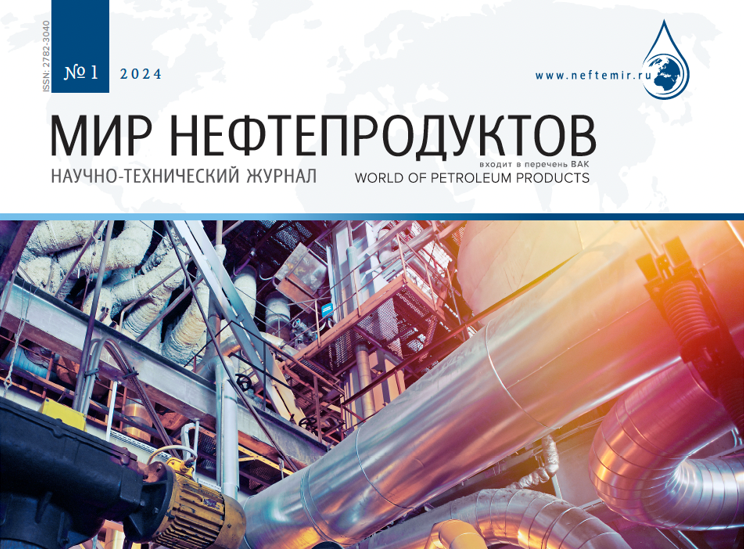CHEMOTOLOGY
Development and testing of energy-saving lubricant M-6Z/14D2K for highly loaded diesel engines DOI: 10.32758/2782–3040-2024-0-6-11
Medzhibovsky A.S., Moikin A.A., Khemchan L.L., Solomonov L.I. (“NPP KVALITET” LLC, Lyubertsy, Moscow region, Russia)
Keywords: lubricants for diesel engines, friction modifier, energy saving, fuel economy, additives.
Abstract. The results of bench tests of the new energy-saving lubricant M-6Z/14D2K produced by NPP KVALITET LLC are presented, and the fuel saving effect is confirmed. The lubricant has been tested and approved for use on diesel engines of Kolomensky Plant LLC.
Chemmotology as a science and its possible prospects DOI: 10.32758/2782-3040-2024-0-1-12-14
Lashkhi V. L. (Firm “NAMI-CHEM” JSC, Moscow)
Keywords: chemmotology, development, prospects.
Abstract. The current state of chemmotology and the prospects for its development for the future are analyzed. It is noted that in terms of methodology and in terms of the level
of professionalism of researchers, today’s chemmotology is far from the state of the 1970–1980s. The current situation needs a radical change.
The Content and Application of ACEA Oil Sequences for Light-Duty and Heavy Duty Engines issued in 2021–2022 years DOI: 10.32758/2782-3040-2024-0-1-16-28
Ivanov A.V. (FAE “The 25th State Research Institute of Himmotology of Ministry of Defense of the Russian Federation”, Moscow)
Keywords: specification, contains, requirements, engine oils, exhaust aftertreatment devices, standartisation, service category, performance properties, ecology.
Abstract. The article discusses a brief history of the appearance, purpose and principle of construction, as well as analyzes the content of the current ACEA European Oil Sequences specifications for motor oils for gasoline and diesel engines of cars issued 2021-2022, provides a set of laboratory and motor test methods for motor oils of classes «A/B,» «C» and «E», their main physical and chemical properties, the specifics of the use of motor oils of various classes and service categories in modern engines, the features of the use of motor oils of European production in the Russian Federation are considered.
Options for upgrading the technological scheme of the process of fractionation of limit gases in order to save energy and increase the production of highly liquid products DOI: 10.32758/2782-3040-2024-0-1-30-38
OIL REFINING: TECHNOLOGY, PROCESSES
Zyikov A.V., Kapustin V.M. (Gubkin Russian State University of Oil and Gas, Moscow)
Keywords: gas fractionation, butane, isobutane, energy efficiency of technological fractionation schemes.
Abstract. The authors of the article assesses the classical fractionation schemes of refinery gases into individual components in order to find options for upgrading technological schemes of installations to reduce energy consumption and increase the production of individual hydrocarbons such as isobutane and butane of normal structure contained in refinery gases. The implementation of solutions for the modernization of the technological scheme of the gas fractionation plant will increase the production of isobutane for the production of a valuable component of automobile gasoline – alkylate. In turn, increasing the energy efficiency of the process has a positive effect on the economics of the process of isomerization of butane of normal structure into isobutane, in order to expand the resource base of the alkylation process.
CHEMISTRY AND TECHNOLOGY OF FUEL AND HIGH-ENERGY SUBSTANCES
High-octane components of motor gasolines as a solution to Russia’s fuel supply problems DOI: 10.32758/2782-3040-2024-0-1-40-52
Safronov E.M.1, Ershov M. A.1,2, Savelenko V. D.1,2, Starostin A.A.1,2, Kapustin V.M1. (1Gubkin Russian State University of Oil and Gas, Moscow; 2LLC «New Technologies Watch Center», Moscow)
Keywords: gasoline, high-octane components, methyl tert-butyl ether, isopropyl alcohol, isobutyl alcohol, isopropylbenzene, octane number, fractional composition.
Abstract. The article provides an analysis of the Russian market for motor gasoline and methyl tert-butyl ether. It has been revealed that there is a significant growing demand for high-octane components and existing restrictions on the production of the highest-tonnage of them (MTBE), which leads to market scarcity and rising prices. A list of promising alternative high-octane components has been determined, the most effective of which are bioethanol, APDC 3014 and N-methylaniline. Based on an expanded set of potential high-octane components and taking into account the characteristics of their fractional composition and octane-increasing characteristics, various experimentally substantiated optimal options for the composition of unleaded AI-92 gasoline have been developed, both corresponding to class K5 according to GOST 32513-2013, and promising ones with a high oxygen content (up to 3. 7% wt.).
PETROCHEMISTRY: TECHNOLOGY, PROCESSES
Effect of domestic and foreign additives on the quality of diesel fuel depending on their dosage DOI: 10.32758/2782-3040-2024-0-1-54-59
Tagirov G.D.1, Vostrikova Y.V.1, Khakimov R.V.2, Kapustin V.M.1, Samarin A.V.2 (1Gubkin Russian State University of Oil and Gas (Gubkin Research Institute), Moscow; 2Russian Peoples’ Friendship University, Moscow)
Keywords: depressor additive, diesel fuel, catalytic dewaxing, depressor-dispersing additive, paraffins, catalysts.
Abstract. The paper studies the influence of additives on diesel fuel properties. Methods of improving low-temperature properties of diesel fuel by means of catalytic dewaxing on an industrial scale are considered. The chemistry of catalytic dewaxing process is considered. Process catalysts, their composition, functions and reactions occurring at their use are considered. Material balance of catalytic dewaxing unit is given. Methods of low-temperature properties improvement by introduction of depressor-dispersing additives are considered. Requirements to additives are outlined. The influence of depressor-dispersing additives on physical and chemical properties of diesel fuel is investigated.
Vadim Levonovich Lashkhi is 80 years old
Alexander Samoilovich Medzhibovsky is 70 years old

